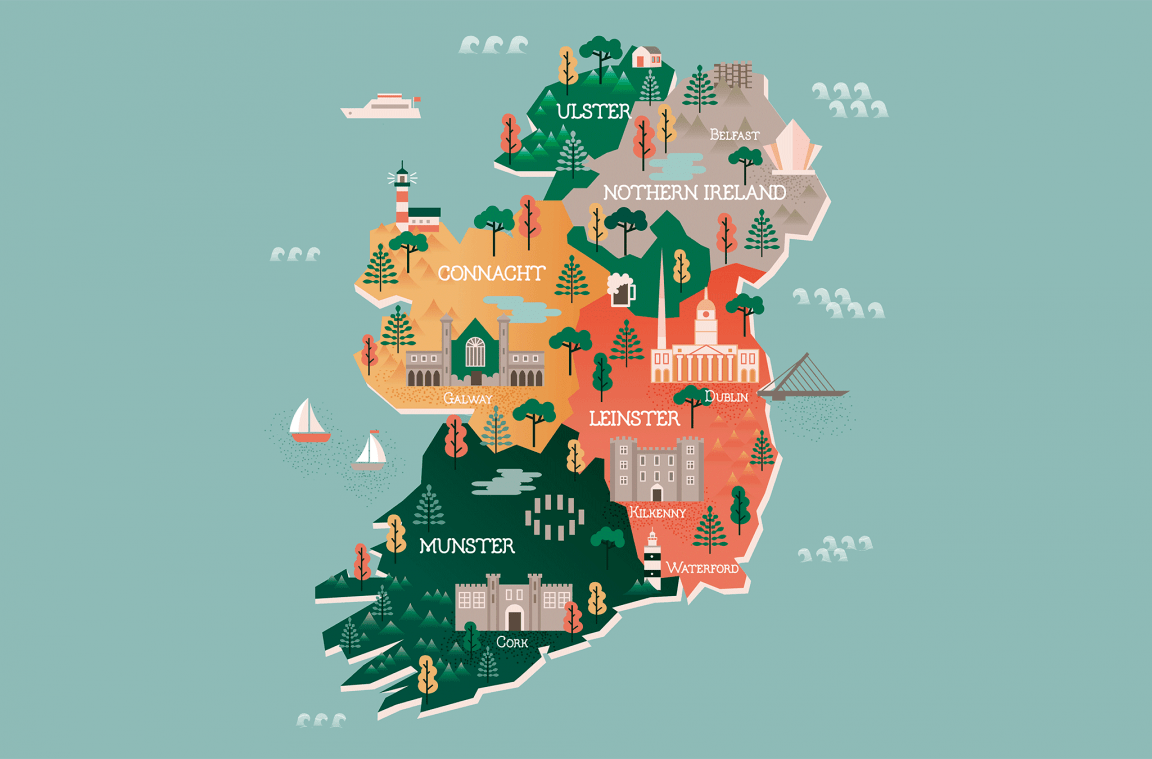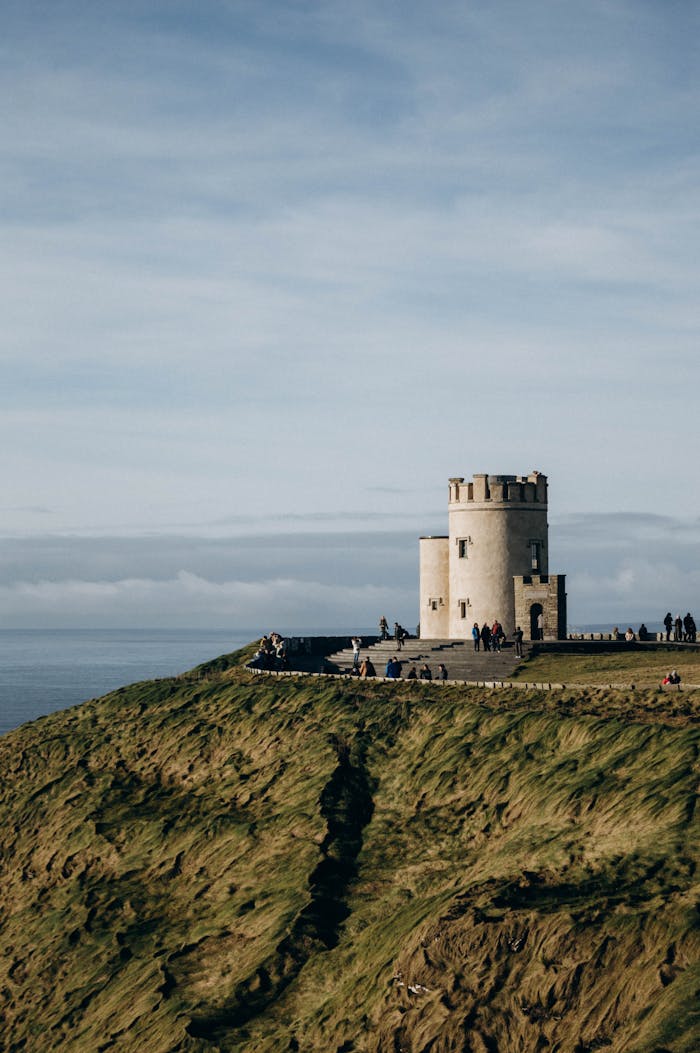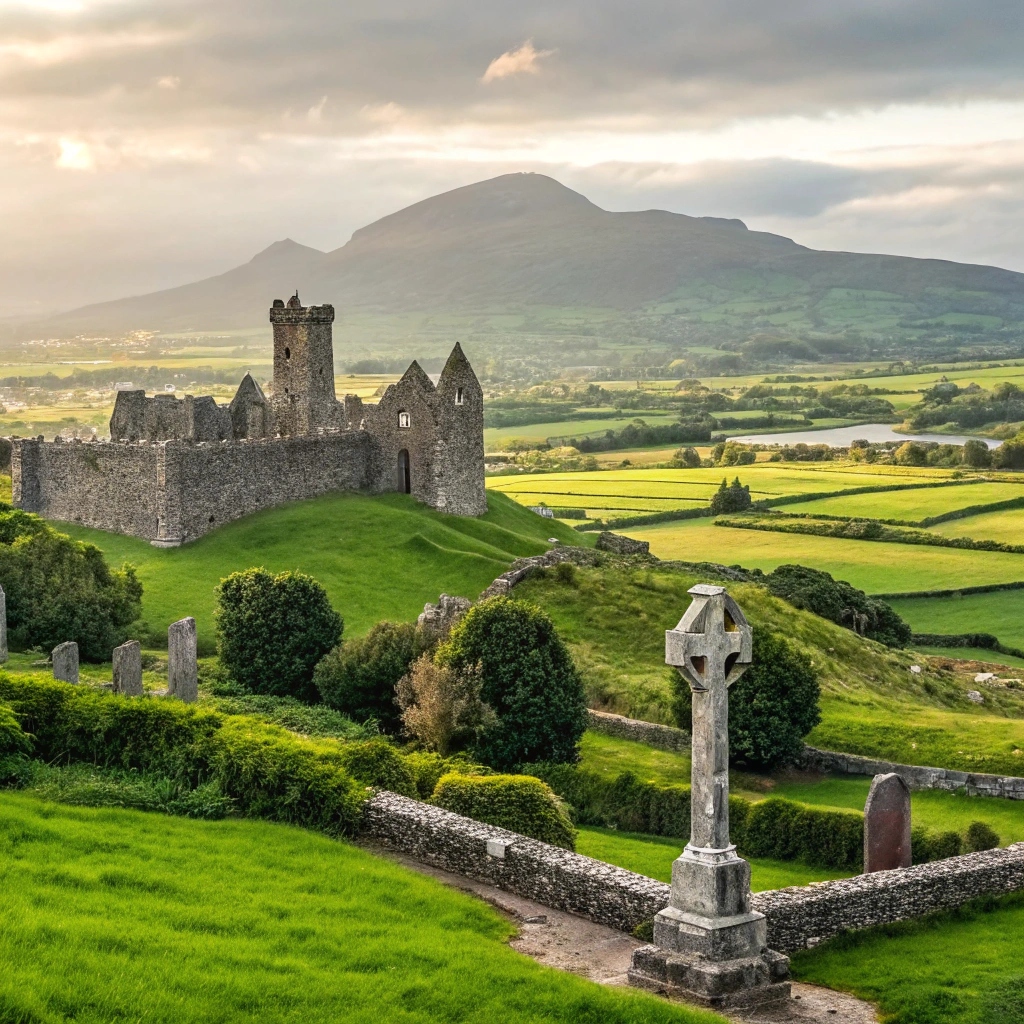Introduction to Ireland Tourism
Welcome to the ultimate guide to exploring Ireland, the magical Emerald Isle that captures hearts with its stunning landscapes, rich history, and warm hospitality. Whether you’re planning your first trips to Ireland or returning to discover more hidden gems, this comprehensive travel guide will help you navigate everything from bustling Dublin streets to serene coastal cliffs. Ireland tourism offers something for every traveler – from history buffs and nature enthusiasts to food lovers and adventure seekers.
Are you ready to embark on an unforgettable Ireland tour? Let’s discover what makes travel to Ireland an experience unlike any other.
Quick Facts About Ireland
Before planning your visit to Ireland, here are some essential facts about this captivating island:
- Location: Located in Northwestern Europe, Ireland is the third-largest island in Europe
- Population: Approximately 5 million people
- Capital City: Dublin
- Currency: Euro (€) in the Republic of Ireland; Pound Sterling (£) in Northern Ireland
- Language: English and Irish (Gaelic)
- Time Zone: GMT (Greenwich Mean Time)
- Best Time to Visit: April to October for milder weather, though Ireland’s charms shine year-round
- Visa Requirements: EU citizens don’t need a visa; many non-EU visitors can stay for up to 90 days
When to Visit Ireland
The best time for travel to Ireland depends on your preferences:
Spring (March-May): Witness Ireland awakening with vibrant greenery and blooming flowers. St. Patrick’s Day (March 17) brings nationwide celebrations.
Summer (June-August): Enjoy longer daylight hours (up to 18 hours!), warmer temperatures, and numerous festivals. This is peak Ireland tourism season.
Autumn (September-November): Experience gorgeous fall colors and fewer crowds while enjoying cultural festivals.
Winter (December-February): Embrace cozy pub atmospheres and possibly snow-dusted landscapes. Christmas markets and New Year celebrations add festive charm.
Top Destinations for Your Ireland Tour
Dublin: The Vibrant Capital
No trips to Ireland are complete without exploring Dublin. This lively capital offers:
- Trinity College and the Book of Kells: Marvel at one of the world’s oldest manuscripts
- Guinness Storehouse: Learn about Ireland’s famous brew with stunning city views from the Gravity Bar
- Temple Bar District: Experience authentic Irish music in this cultural hub
- Dublin Castle: Explore 800 years of Irish history
- St. Patrick’s Cathedral: Visit Ireland’s largest cathedral
The Wild Atlantic Way
This 2,500km coastal route is a highlight of Ireland tourism, featuring:
- Cliffs of Moher: Stand 214 meters above the Atlantic Ocean for breathtaking views
- Ring of Kerry: Drive through this scenic peninsula with mountains, lakes, and charming villages
- Dingle Peninsula: Discover ancient monuments and picturesque beaches
- Connemara: Experience the rugged beauty of Ireland’s west coast
- Skellig Islands: Visit these remote UNESCO World Heritage sites
Ireland’s Ancient East
History buffs planning travel to Ireland will treasure:
- Newgrange: Explore this prehistoric monument older than the pyramids
- Rock of Cashel: Visit the medieval religious site with round tower and Gothic cathedral
- Kilkenny: Wander through this medieval city with its imposing castle
- Glendalough: Discover the 6th-century monastic settlement in a glacial valley
- Boyne Valley: Step back in time at this archaeological landscape
Northern Ireland Highlights
Complete your Ireland tour with these northern treasures:
- Giant’s Causeway: Wonder at 40,000 interlocking basalt columns
- Belfast: Explore the Titanic Quarter and learn about the city’s complex history
- Carrick-a-Rede Rope Bridge: Test your courage crossing this famous rope bridge
- Dark Hedges: Walk the atmospheric tree-lined road made famous by Game of Thrones
- Mourne Mountains: Hike through landscapes that inspired C.S. Lewis’s Narnia
10 Unmissable Ireland Things to Do
- Pour the Perfect Pint at the Guinness Storehouse in Dublin
- Kiss the Blarney Stone at Blarney Castle for the “gift of eloquence”
- Attend a Traditional Music Session in an authentic Irish pub
- Drive the Scenic Sky Road in Clifden for panoramic Atlantic views
- Explore the Aran Islands with their prehistoric forts and traditional lifestyle
- Take a Literary Tour following the footsteps of Yeats, Joyce, and Wilde
- Taste Irish Whiskey at one of the island’s many distilleries
- Visit Kylemore Abbey in Connemara, with its Victorian walled garden
- Learn Irish Dancing at a céilí (traditional dance gathering)
- Attend a Hurling Match, experiencing Ireland’s ancient national sport
Accommodation Options Across the Emerald Isle
Ireland offers diverse places to stay during your visit:
- Historic Castles: Experience royal treatment at Ashford Castle or Dromoland Castle
- Cozy B&Bs: Enjoy Irish hospitality and home-cooked breakfasts
- Farm Stays: Connect with rural Ireland and experience authentic country living
- City Hotels: Find everything from luxury to budget options in urban centers
- Coastal Cottages: Rent self-catering accommodations with ocean views
- Unique Stays: Try lighthouse keepers’ cottages or converted churches
Getting Around During Your Visit to Ireland
Navigating the Emerald Isle is part of the adventure:
- Rental Car: The most flexible option for exploring rural areas (note: driving is on the left)
- Trains: Connect major cities with comfortable service
- Buses: Extensive network covering towns and villages
- Guided Tours: Let experts handle the logistics while sharing local insights
- Cycling: Great for short distances and dedicated routes like the Great Western Greenway
- Walking: Perfect for city exploration and hiking famous trails
Irish Cuisine: What to Taste
Ireland’s food scene has evolved far beyond potatoes:
- Irish Stew: Traditional hearty lamb stew with vegetables
- Boxty: Potato pancakes served with various fillings
- Seafood: Fresh salmon, mussels, and oysters from coastal waters
- Soda Bread: Authentic Irish bread made without yeast
- Full Irish Breakfast: Fuel your day with this hearty morning meal
- Colcannon: Mashed potatoes mixed with kale or cabbage
- Artisanal Cheeses: Try Cashel Blue and other local varieties
- Craft Beers: Beyond Guinness, discover Ireland’s thriving craft beer scene
Practical Tips for Travel to Ireland
Ensure smooth trips to Ireland with these suggestions:
- Weather Preparedness: Pack layers and rain gear regardless of season
- Power Adapters: Ireland uses type G plugs (same as UK) with 230V supply
- Tipping: Generally 10-15% in restaurants if service charge isn’t included
- Insurance: Travel insurance is highly recommended
- Driving: Remember to drive on the left and consider car size for narrow rural roads
- Currency Exchange: Have both Euro and Sterling if visiting Northern Ireland
- Booking Ahead: Reserve popular attractions during peak season
- Phrase Book: While English is widespread, learning a few Irish phrases is appreciated
Sustainable Tourism in the Emerald Isle
As Ireland tourism grows, consider these responsible travel practices:
- Public Transportation: Reduce your carbon footprint when possible
- Support Local: Choose locally-owned accommodations and restaurants
- Leave No Trace: Protect Ireland’s natural beauty, especially in popular sites
- Respect Local Communities: Be mindful of noise levels and private property
- Seasonal Awareness: Consider visiting outside peak months to reduce overtourism
- Water Conservation: Ireland may be green, but water usage awareness is important
Annual Festivals and Events
Time your visit to Ireland around these cultural celebrations:
- St. Patrick’s Festival (March): The world-famous celebration of Ireland’s patron saint
- Galway International Arts Festival (July): Two weeks of theater, music, and visual arts
- Electric Picnic (September): Ireland’s premier music and arts festival
- Dingle Food Festival (October): Celebrate Irish cuisine in this charming coastal town
- Wexford Festival Opera (October-November): Internationally acclaimed opera festival
- Kilkenny Arts Festival (August): Showcasing the best of Irish and international arts
- Puck Fair (August): One of Ireland’s oldest traditional fairs in Kerry
- Dublin Theatre Festival (September-October): Cutting-edge theatrical performances
Safety and Accessibility
Ireland is generally very safe for tourists, with these considerations:
- Emergency Number: 112 or 999 for police, fire, or medical emergencies
- Healthcare: Visitors from EU countries should bring their European Health Insurance Card
- Accessibility: Many attractions have improved access, but historic sites may have limitations
- LGBTQ+ Travelers: Ireland is generally welcoming, having legalized same-sex marriage by popular vote
- Solo Travelers: Ireland is considered safe for solo travel, including for women
Day Trips and Excursions
Maximize your time with these popular day trips:
- From Dublin: Journey to Newgrange, Howth Peninsula, or Wicklow Mountains
- From Galway: Visit the Aran Islands, Connemara, or the Burren
- From Cork: Explore Cobh (Titanic’s last port), Kinsale, or Blarney Castle
- From Belfast: Day trip to Giant’s Causeway, Carrick-a-Rede, and Bushmills Distillery
- From Killarney: Drive the Ring of Kerry or visit Dingle Peninsula
Crafting Your Perfect Ireland Itinerary
7-Day Highlights Tour
- Days 1-2: Dublin exploration
- Day 3: Travel to Galway via Clonmacnoise
- Day 4: Cliffs of Moher and the Burren
- Day 5: Connemara National Park
- Day 6: Travel to Killarney
- Day 7: Ring of Kerry
14-Day Comprehensive Tour
- Days 1-3: Dublin and surroundings
- Days 4-5: Belfast and Antrim Coast
- Days 6-7: Donegal and Sligo
- Days 8-10: Galway, Connemara, and Aran Islands
- Days 11-12: Dingle Peninsula and Killarney
- Days 13-14: Cork, Kinsale, and Rock of Cashel
Shopping in Ireland: What to Bring Home
Remember your trips to Ireland with these authentic souvenirs:
- Aran Sweaters: Hand-knitted wool sweaters with distinctive patterns
- Celtic Jewelry: Pieces featuring traditional Irish symbols
- Waterford Crystal: World-famous glassware
- Irish Whiskey: Bottles from artisanal distilleries
- Woolen Blankets: Cozy throws from Avoca or other Irish mills
- Traditional Music: CDs from musicians you discover in local pubs
- Claddagh Rings: Traditional Irish rings representing love, loyalty, and friendship
- Irish Books: Works by the country’s celebrated authors
Budget Planning for Visit to Ireland
Plan your expenses with these general guidelines:
- Budget Travel: €70-100 per day (hostels, public transport, budget meals)
- Mid-Range: €150-250 per day (B&Bs, some restaurants, car rental)
- Luxury: €300+ per day (upscale hotels, fine dining, exclusive experiences)
- Money-saving Tips: Consider Heritage Cards for attraction discounts, eat lunch specials rather than dinner at restaurants, and travel during shoulder season
Ireland for Special Interest Travelers
Literary Ireland
Follow the footsteps of Joyce, Yeats, Wilde, and Swift in Dublin’s literary pubs and the landscapes that inspired them.
Genealogy Tourism
Trace your Irish roots at the National Library of Ireland or local heritage centers.
Golf Enthusiasts
Play world-class courses like Royal Portrush, Ballybunion, and Lahinch.
Photography Journeys
Capture Ireland’s dramatic landscapes from the Causeway Coast to Dingle Peninsula.
Whiskey Trails
Tour distilleries from Jameson and Bushmills to newer craft producers.
Conclusion: Why Visit Ireland?
The Emerald Isle promises more than just spectacular scenery – it offers experiences that will stay with you long after your journey ends. From ancient myths echoing through stone circles to the lively conversations in village pubs, Ireland’s magic lies in connecting travelers to something timeless and genuine.
Whether you’re drawn by ancestral ties, literary legends, or simply the allure of those forty shades of green, travel to Ireland rewards visitors with authentic experiences and warm welcomes. As the Irish blessing goes, “May the road rise up to meet you” – and may that road lead you to unforgettable adventures across this enchanted island.
Start planning your Ireland tour today, and discover why visitors have been falling in love with the Emerald Isle for centuries.
Ireland Tourism FAQs
What’s the best way to experience authentic Ireland? Venture beyond tourist hotspots into small towns and villages where traditional music sessions, local festivals, and genuine Irish hospitality await.
Do I need a car for trips to Ireland? While public transportation connects major destinations, a car provides freedom to explore rural areas and hidden gems at your own pace.
What’s the weather really like in Ireland? Ireland’s climate is mild but changeable. The famous saying “four seasons in one day” is accurate—always pack layers and rain gear regardless of when you visit.
Is Northern Ireland part of the same country? Northern Ireland is part of the United Kingdom, while the Republic of Ireland is an independent country. You can freely travel between them, but they use different currencies.
What are some lesser-known but must-see places in Ireland? Consider Achill Island, the Beara Peninsula, Slieve League Cliffs, Glenveagh National Park, and the Copper Coast for off-the-beaten-path experiences during your visit to Ireland.


